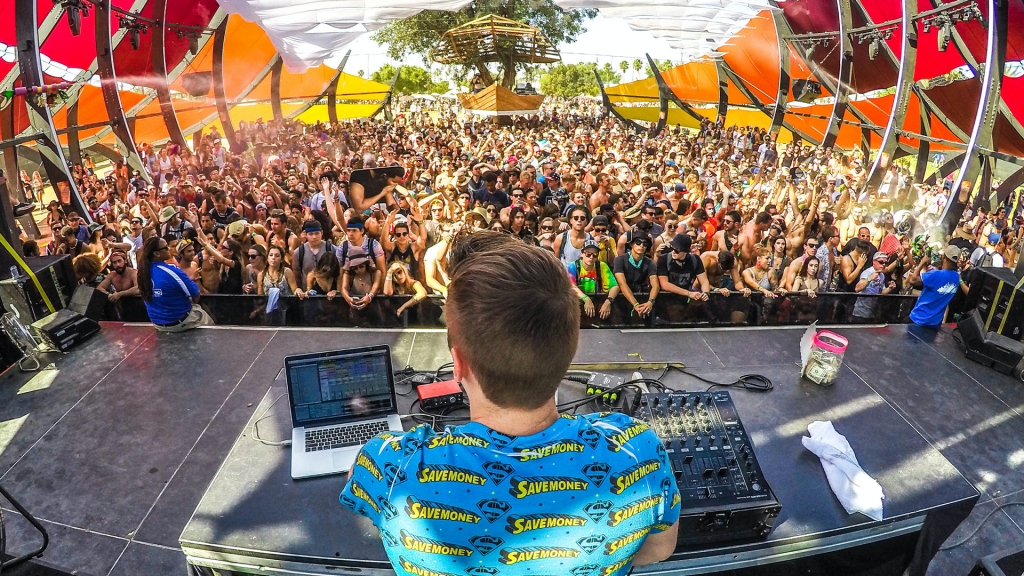Introduction
Music production is an essential skill for any DJ looking to take their craft to the next level. As a DJ, your ability to create your own tracks and incorporate them into your sets is crucial for standing out in a crowded industry.
In this blog post, we’ll be discussing the basics of music production for DJs, including the tools and software needed to get started, as well as the different elements of a track and how they are produced.
We’ll also be covering the benefits of creating your own tracks and how to incorporate samples and loops into your sets. Finally, we’ll be discussing the importance of mastering your tracks and the tools and software available for doing so.
Whether you’re just starting out in music production or looking to take your skills to the next level, this post will provide you with valuable insights and tips for producing music as a DJ.
The Basics of Music Production for DJs
Before we dive into the specifics of music production for DJs, let’s first define what music production is. Music production is the process of creating a recorded or live performance of a musical composition, which involves a range of activities such as writing, arranging, recording, mixing, and mastering.
For DJs, music production involves creating tracks that can be used in their sets or played on the radio. Producing music allows DJs to create unique tracks that stand out from others in their genre, giving them a competitive edge in the industry.
To get started with music production, DJs need a few essential tools, including a computer, audio interface, studio monitors, headphones, and a MIDI controller. Additionally, DJs need software to create and produce their tracks. There are many different types of software available for music production, including digital audio workstations (DAWs), plugins, and virtual instruments.
One of the most popular DAWs used by DJs is Ableton Live. Ableton Live allows DJs to create, record, and produce their tracks using a wide range of tools and features. Additionally, Ableton Live allows DJs to integrate their tracks seamlessly into their sets, providing a more cohesive and engaging experience for their audience.
Once you have your tools and software set up, it’s time to start creating your track. A track is typically made up of several different elements, including drums, bass, melodies, and vocals. Each element can be produced using a range of techniques and tools, including synthesisers, samplers, and effects processors.
In the next section, we’ll be discussing how to create your own tracks and the different types of software available for doing so.
Creating Your Own Tracks
Creating your own tracks is a great way to showcase your creativity as a DJ and stand out from others in the industry. When creating a track, there are several steps involved, including coming up with a concept, writing the composition, recording, editing, and mixing the track.
To get started with creating your own tracks, you’ll need to choose the right software. There are several different types of software available for creating tracks, including Ableton Live, Logic Pro X, FL Studio, and Reason. Each software has its own unique features and workflows, so it’s essential to choose one that suits your needs and preferences.
Once you have your software set up, the first step in creating a track is coming up with a concept. This can involve brainstorming ideas for melodies, rhythms, and chord progressions. You may also want to consider adding vocals or other elements to your track to make it more unique and memorable.
After you’ve come up with a concept, it’s time to start writing the composition. This involves selecting the instruments and sounds you want to use and arranging them in a logical and coherent way. You may also want to experiment with different effects and techniques to add depth and texture to your track.
Once you’ve written the composition, it’s time to record and edit the track. This involves recording the various elements of the track, such as the drums, bass, and melodies, and then editing them to ensure they sound cohesive and polished. You may also want to add additional layers or effects to your track to make it more interesting and dynamic.
Finally, it’s time to mix the track. Mixing involves adjusting the levels, panning, and EQ of each element to ensure they sound balanced and clear. You may also want to add effects such as reverb or delay to create a sense of space and depth in the track.
Creating your own tracks can be a time-consuming and challenging process, but it’s also incredibly rewarding. With the right tools and software, you can create tracks that are unique, memorable, and showcase your creativity as a DJ.
Using Samples and Loops in Your Sets
In addition to creating your own tracks, using samples and loops in your sets can also enhance your performance as a DJ. Samples and loops are short audio clips that can be used to add texture, variation, and excitement to your sets.
There are several types of samples and loops available, including drum loops, bass loops, vocal samples, and sound effects. Many DJs create their own samples and loops, but there are also plenty of pre-made samples and loops available for purchase online.
To incorporate samples and loops into your sets, you’ll need a sampler or a DJ controller with built-in sampling capabilities. Some popular samplers used by DJs include the Native Instruments Maschine, Akai MPC, and Roland SP-404.
Once you have your sampler set up, you can start incorporating samples and loops into your sets. One technique is to layer samples and loops over existing tracks to add depth and variation. For example, you could add a drum loop over a section of a track to create a more energetic and dynamic section.
You can also use samples and loops to create your own remixes or mashups. For example, you could take the vocals from one track and add them to the instrumental of another track to create a unique and memorable remix.
Using samples and loops in your sets requires a bit of practice and experimentation, but it can be a great way to add excitement and variation to your performances. Just be sure to use them sparingly and in a way that complements the existing tracks in your set.
In the next section, we’ll be discussing the importance of mastering your tracks and the tools and software available for doing so.
Mastering Your Tracks
Mastering is the final step in the music production process and involves preparing a track for distribution or release. The goal of mastering is to ensure that the track sounds polished, balanced, and professional across a range of playback systems.
To master your tracks, you’ll need mastering software and tools. There are several types of software available for mastering, including iZotope Ozone, Waves L3 Multimaximizer, and Steinberg WaveLab.
The first step in mastering your track is to prepare the mixdown. This involves exporting the various elements of the track, such as the drums, bass, and melodies, into a single stereo track. You may also want to adjust the levels, EQ, and compression of each element to ensure they sound balanced and polished.
Once you have your mixdown prepared, it’s time to start mastering. This involves applying various techniques and tools, such as EQ, compression, and limiting, to the track to ensure it sounds balanced and polished. You may also want to add effects such as reverb or delay to create a sense of space and depth in the track.
When mastering your tracks, it’s important to keep in mind the playback systems your track will be heard on. You’ll want to ensure that your track sounds good across a range of devices, including headphones, speakers, and car stereos.
Mastering your tracks can be a complex and technical process, but it’s also essential for ensuring that your tracks sound polished and professional. With the right tools and software, you can create tracks that sound great across a range of playback systems.
Conclusion
In conclusion, music production is an essential skill for DJs looking to take their craft to the next level. Creating your own tracks and incorporating samples and loops into your sets can help you stand out in a crowded industry and showcase your creativity as a DJ.
Additionally, mastering your tracks is essential for ensuring that your tracks sound polished and professional across a range of playback systems.
By following the tips and techniques outlined in this post, you can improve your music production skills and create tracks that are unique, memorable, and engaging.
When you’re ready to start promoting the tracks you’ve produced, sign up with Novecore for free and start selling your music on all major platforms.




